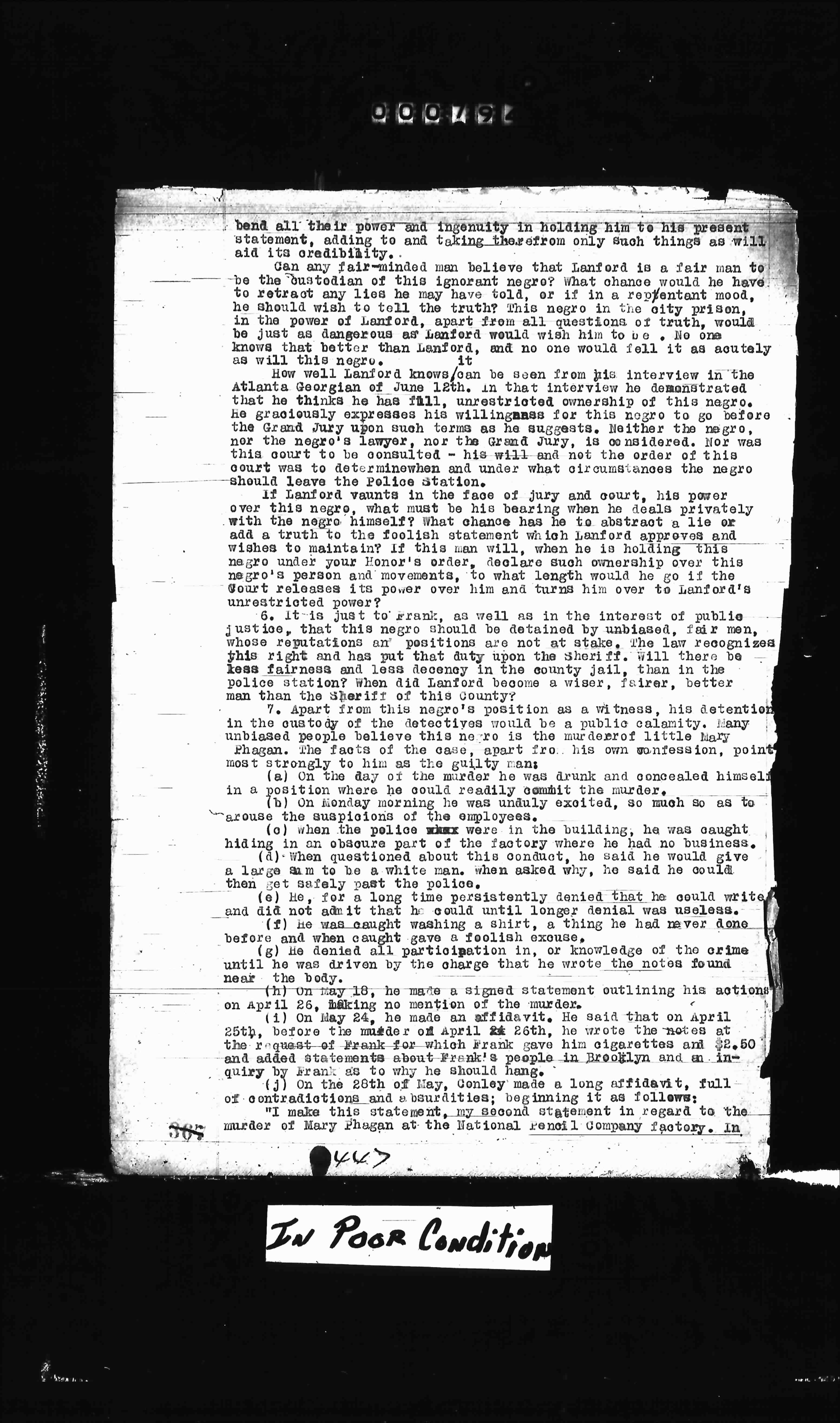
Visible Translated Text Is As Follows:
bend all their power and ingenuity in holding him to his present statement, adding to and taking therefrom only such things as will aid its plausibility. I am informed that Lemford is a fair man to the ordinary-minded man, but how can he be fair to this ignorant negro? What chance would he have to retract any lies he may have told or if in a repentant mood, he should wish to tell the truth? This negro in the city prison, in the power of Lemford, apart from all questions of truth, would be just as dangerous as Lemford would wish him to be. No one knows this better than Lemford, and no one would tell it as acutely as will this negro.
How well Lemford knows this is seen from his interview in the Atlanta Georgian of June 15th. In that interview he demonstrated that he thinks he has failed, unless he can get for this negro the same opportunity for examination as was given to go before the Grand Jury by such formal games as he has in mind. Nor was this court to be consulted - his will and not the order of this court was to determine when and under what circumstances the negro should leave the police station.
If Lemford vaunts in the face of jury and court, his power over this negro, what must be his bearing when he deals privately with the negro himself? What chance has he to abstract a lie or a truth from this foolish element which Lemford approves and which he thinks he can mold to his will, when he has the handling of this negro under your Honor's apron? Lemford's opportunity to go if the court releases its power over him and turns him over to Lemford's unrestricted power?
6. It is just to Frank, as well as in the interest of public justice, that this negro should be detained by unbiased, fair men, whose regulations are positions are not at stake. The law recognizes this right and has put that duty upon the sheriff. I will there be less fairness and less decency in the county jail, than in the police station when did Lemford become a wiser, fairer, better man than the sheriff? This negro's position as a witness, his detention in the custody of the detective would be a public calamity. Many unbiased people believe this negro is the murderer of little Mary Phagan. The facts of the case, apart from his own confession, point most strongly to him as the guilty man.
(a) On the day of the murder he was drunk and concealed himself in a position where he could readily commit the murder.
(b) On Monday morning he was thinly excited, so much so as to arouse the suspicions of the employees.
(c) When the murder was committed, he was caught hiding in a place apart from the place where he had no business.
(d) When questioned about the crime, he said he would give a large sum to be a white man, which, if asked why, he said he could then get safely past the police.
(e) He, for a long time persistently denied that he could write and did not admit that he could write until it was useless.
(f) He was caught washing a shirt, a thing he had never done before and when caught gave a foolish excuse.
(g) He denied all participation in, or knowledge of the crime until he was driven by the charge that he wrote the notes found near the body.
(h) On May 18, he made a signed statement outlining his actions on April 26th, making no mention of the murder.
(i) On May 24, he made an affidavit. He said that on April 25th, before he made the affidavit, he wrote the notes at the request of Frank for which Frank gave him cigarettes and $2.50 and asked statements about French people in Brooklyn and an inquiry by Frank as to why he should hang.
(j) On the 28th of May, Conley made a long affidavit, full of contradictions and absurdities, beginning it as follows:
"I make this statement, my second statement in regard to the murder of Mary Phagan at the National Pencil Company factory. In